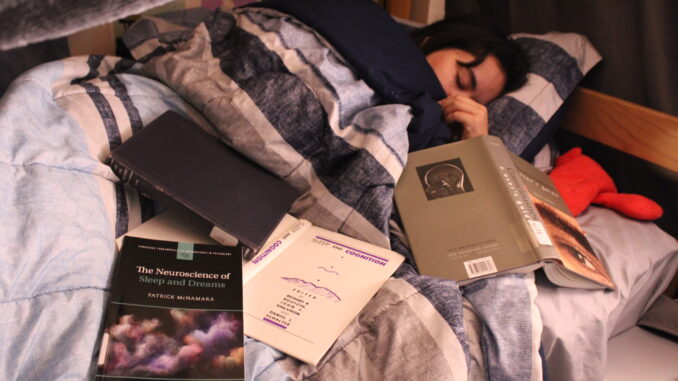
Your alarm is blaring. It’s 7 a.m. on a Monday, and you have an exam in an hour. Did you get enough sleep?
An early morning exam is just one of many possible priorities that may cause sleep to fall to the wayside for undergraduate students. However, not prioritizing good sleep comes with consequences.
Psychology professor Brooke Van Loh said sleep affects many aspects of our functioning. The more time you spend awake, the more tired you become, Van Loh said. Biologically, it’s important to “reset” your internal clock.
“Sleep deprivation affects our cognition, our focus, our ability to pay attention; it affects our socialness,” Van Loh said. “We get grumpy when we don’t have enough sleep.”
Dallas first-year Sara Oballe said it can be stressful to balance work, life and sleep with “daily essential tasks.” Oballe added that she has trouble sleeping while dealing with homesickness as well.
When we are sleep-deprived, Van Loh said it can be hard to handle difficult situations, since “our body’s not at its peak.”
Why is Sleep so Important?
According to a 2021 article by the Huntington News, “all-nighters are a common antidote to a busy schedule” for many undergraduate students. Whether it be for last-minute cramming or just to hang out with friends, all-nighters take time away from sleeping.
No matter what the reason is, a lack of sleep can have a negative effect on both physical and mental health, according to a 2021 paper published by the American Academy of Sleep Medicine.
Making time during the day is important to ensure enough sleep during the night, according to associate professor of psychological science Tammy Jechura. Jechura said the key to a good night’s rest is getting 7–9 hours of sleep each night.
Sleep is essential for memory consolidation, as college students attempt to “cram” as much information in their brains as they can, Van Loh said. Additionally, going to bed and waking up at the same time every day is “important for all sorts of health.”
Pontiac first-year Carli Jones said she’s maintained the same sleep schedule her whole life, and it’s “worked for her.”
“There’s sleep and there’s good sleep,” Van Loh said. “It’s stupid important in college.”
According to a 2023 article by WebMD, without the proper amount of sleep, over time your body begins to malfunction due to a phenomenon called “sleep debt.”
Further, Jechura said it may become difficult to make “strong memories,” focus or stay physically coordinated.
Tips on Getting to Sleep
What if, for whatever reason, you aren’t tired enough to go to bed? Jechura suggests a few solutions, including a hot bath or shower before hitting the hay.
“When you get out of the shower, you let your body cool and that cooling signals to your brain to make melatonin, and you get sleepy,” Jechura said.
Another tip from Jechura is to practice “progressive relaxation.” Clench your toes for a few seconds and then release them. Slowly progress through every muscle you can until you reach your scalp, and by that time Jechura said, “you’ll already be asleep.”
If all else fails, Van Loh said movement may be the key.
“If you find you can’t sleep, get up, move around, do something,” Van Loh said. “The longer you think about the fact that you can’t sleep, the harder it’s going to be to go to sleep.”
Van Loh encourages students to “come talk” to faculty if they are having issues. There are resources on campus for anyone struggling with sleep, such as counseling services.
According to Jechura, college is a time to “figure out” what is important to you in life. She said that finding the balance between sleep and everything else is as simple as answering the question:
“What are you willing to give up?”
Bonnie Lord also contributed reporting to this story.

Great Article